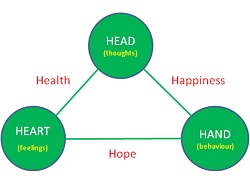- Goals - to direct their energy, giving it purpose and direction
- Tools - a growing collection of knowledge and skills
It also helps if they can gradually deepen their understanding and mastery of what is going through their heads, hearts and hands; their thoughts, feelings and behaviour, respectively.
A journey of discovery about self, others and the world
As with all of us, their journeys will, from time to time, change direction. They will encounter obstacles and difficulties and they will experience ups and downs – but it doesn’t help if their heads, hearts and hands go off in different directions! It is better if these key elements of their character are in harmony in order for the person to achieve happiness.
For example, a comment might spark a very angry feeling. If the learner can quickly give it some thought, such as counting up to 10, then it is likely that the response or action taken will be a more measured one. Such strategies may well affect interpersonal dealings and thus the person’s happiness; internal equilibrium and thus the person’s health; and decision-making and thus staying the right side of the law.
Whatever is deep within us is reflected on the outside. When there is order and harmony inside us, it is mirrored in our whole life and the way in which we live it. How we are inside 'wells up' and comes out in everything that we think, feel and do. So, when we experience inner confusion and unrest, our state of being cannot be hidden. It will be reflected in how we live our lives which will in turn affect our happiness, health and the ability to maintain a hopeful outlook.
Putting modern life skills to good use
The World Health Organisation states that, "Life skills are the abilities for adaptive and positive behaviour that enable individuals to deal effectively with the demands and challenges of everyday life."
The identified skills have been divided into cognitive, personal and interpersonal abilities; learning to know, learning to be and learning to live together, respectively.
Albert Einstein once said, "Try not to become a man of success but rather try to become a man of value."
Young high-fliers are beacons of light
Early in October this year, an event took place in Johannesburg bringing together from 190 countries, 1300 socially committed persons aged between 18 and 30, each already demonstrating inspiring leadership qualities. More countries were represented at this fourth annual summit of One Young World than at any other global event bar the Olympics!
The primary activity at this summit is to ensure the delegates’ concerns, opinions and solutions are heard as they debate pressing issues the world faces. Afterwards, with their skills and mindsets, and empowered by their grasp of the enormous potential of the technology revolution, they take action, driving positive change in their countries, communities or workplaces.
Each such summit is facilitated by high-profile ‘counsellors’, who have excelled in their various fields. They range from politicians, activists, founders and CEOs to musicians, models, sports stars and chefs. The one thing that all these great leaders have in common is that they have consistently put others before themselves. They have left self-interest on one side in order to drive progress and change.
While many people may not be able to feel optimistic about the present, when Kofi Annan, the seventh Secretary-General of the United Nations and a One Young World Counsellor, addressed the delegates he said: “I feel confident that the future is in good hands and that you will succeed where my generation has failed”.


















